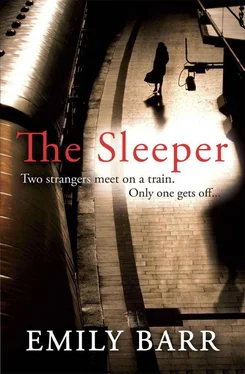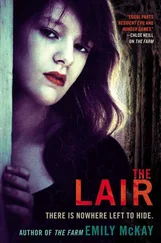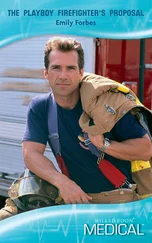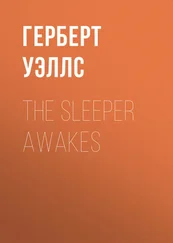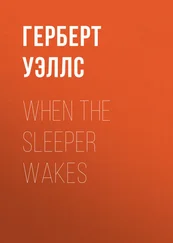‘Really?’ he said. ‘Are you telling me this as a police officer, or as a friend?’
I shrank inwardly from that word.
‘I’m telling you as Alex Zielowski. You’re … well, I suppose you’re both of those things. Whichever you would like it to be.’
‘Yes. Well. Look, I’m at work today, and I do actually need to get on with it, and as you know, the whole Lara thing is not remotely within my remit because it’s a Penzance investigation. But what I’ll do is, I’ll see if I can find a way to check out your details. It’s not easy. I should fill in a Data Protection Form. But let’s see. Do you know your passport number, by any chance?’
‘I wish I did.’
‘I’ll do what I can. I have a meeting I should be in right now, but I’ll call you later, if I may.’
‘Of course. Any time.’
‘Thank you. And Iris?’
‘Yes?’
‘Is your boyfriend all right? At home without you?’
‘He’s fine,’ I said quickly. ‘Don’t worry about him.’
‘Of course. Well, have a good day in London, and I’ll speak to you later.’ His voice suddenly went formal at the end, and I sensed someone in the room with him.
‘Bye.’
I sat on the bed and stared at the phone and sipped my tea. I realised I was smiling. I had called Budock several times, but Laurie never picked up. Today I decided I would not even attempt it. He knew how to get hold of me.
I looked at the phone, knowing I could pick it up and do something radical. I could, for instance, call my mother. My hand stretched towards it. I would only have to say hello.
‘Hello?’ she would say, in that vague-yet-aggressive way of hers. ‘Hello? Iris, darling, is it you? Oh, you ridiculous girl, where have you been?’
That was why I couldn’t do it. They all thought I had overreacted to an absurd extent. Of course they did. The world was crammed with broken hearts, and the proper way of dealing with it was to be sad for a judicious amount of time, then move on. It was not to run away to Cornwall at the age of thirty-two and closet oneself and one’s lover away indefinitely.
Alex’s call made me get on the District Line, even though I didn’t want to. There was something about him that made me want to do the right thing. I sat on the Tube with my mind blank, watching people. A man was asleep, his head leaning back against the window, jerking upright from time to time. An old woman frowned in concentration at the book she was reading, so absorbed that I wondered whether she would miss her stop. Perhaps she already had.
After Earls Court, it thinned out completely. The sleeping man and the reading woman were still on, as was a harried-looking man with a baby in a sling and a young woman with ill-advised patterned leggings and a top that was too short, who was doing something on her phone with furious concentration.
As we approached East Putney, now overground, with rain lashing tightly against the window, I stood up like an automaton and walked to the door.
It was the same as it had always been, and the familiar mundanity kept me going through the station hall, which was the same as every Tube station ticket hall with its stash of free newspapers and sparsely manned ticket office, yet different and particular to itself in its shape, its detail, its very essence.
All my journeys used to start here. I went to school from this station. I met my friends here. I bought my Travelcard and set out into the world from here.
My legs walked me along the road, still busy with cars, buses, vans and taxis, all belching out their fumey clouds, and across the High Street, which was smarter than it used to be, and then picked their way through the affluent streets close to the river. I stepped around the puddles, jumped over a little flood in the gutter.
The houses must have been worth millions by now. They were beautifully tended, with exteriors immaculately cleaned, the brickwork impeccable. Some of them were flats, of course. That had always been the case. Even the flats were magazine-smart these days.
The house on the corner had grass that was so lush and so beautifully tended that every fat blade was the same length. A child’s tricycle, wooden of course, was parked neatly on a honey-stone patio, and a mosaic-topped table with four matching chairs stood stoically in the rain, waiting for spring and the sun.
That house used to belong to the Grimaldis. They were in their seventies, a gay couple, and they had lived there for ever. Bert and Jonno, those were their names. Jon had taken Bert’s surname because, I recalled him saying, ‘Why would you go through life being called Bottomley when you could become a Grimaldi?’
They had moved, or died, since I was last here. I wondered which it was.
Every house I passed assaulted me with memories. I walked on, tramping the street on which I had learned to ride a bike, the road to my nursery school. I remembered racing my sister, Lily, from the corner to our front door, both of us arriving red-cheeked and breathless, laughing, desperate to be the winner.
I was glad it was raining. My hair was bedraggled, down my back, and my clothes were clinging uncomfortably. That felt right.
I passed a woman pushing a huge buggy with two babies in it, side by side. She was probably younger than me, but she was exclusively a mother. Her exhaustion was covered with make-up and, I supposed, expensive creams, yet was impossible to erase. She had the chunky look of someone once slim who had given birth to twins within the past six months. Her clothes were expensive yet practical: jeans, Fly boots, a blue anorak zipped against the elements, and her hair was blond with dark roots, scraped back into something like a bun.
I smiled as we passed, and she smiled back, conspiratorial, assessing me, I felt, as someone who might have been through it myself.
I was almost surprised that she could see me. I felt I was walking this street like a ghost.
The house was still there, and my parents still lived in it. Their black Volvo was parked on the drive. The same curtains hung at the downstairs windows. I stood on the other side of the street and looked.
All I needed to do was take a few steps and ring the bell. They might not be there. I would not need to explain myself. They would, I knew, be unequivocally delighted to see me back. They loved me. They had lost me.
When I saw a figure at the window, however, I knew I could not do it. Perhaps one day I would, but for now I turned and fled, back along the claustrophobically familiar streets, down to the river, across the bridge and, randomly, into Fulham. At first I thought I heard someone calling my name, but then it stopped.
I called Olivia from a street corner. Happily, she did not bother asking how I was.
‘I was thinking,’ she said, instead. ‘You should talk to Lara’s godfather. Leon Campion. She was close to him. She is, I mean. I tried to talk to him about her when this happened, but he wasn’t going for it. He doesn’t like me. Never has. I’m the enemy, in his book. If there were T-shirts being made up, his would say “Team Lara” across his tits.’
‘Oh. Right.’ The opportunity to concentrate on something other than myself came as a glorious relief, and I forced myself to focus. ‘Who is he? Her godfather? Her actual godfather?’
‘Yes. An old mate of Dad’s. He’s a bit of a player, I think. He’s into mysterious business deals and all that. Kind of smooth. He and Lara have always been close. I’ve never really worked it out. I thought they were shagging for a while, and I still think they might have been at some point. There’s something between them, anyway. It might not be sex. But it’s something.’
‘Where do I find him?’
‘I’ll text you his number. He’ll tell you to fuck off, but it’s worth a try. He must be incredibly cut up about Lara, and I know he’s been at Mum and Dad’s house quite a bit. You should probably do to him what you did to me, if you can bear it. Go to see him face to face. Turn up at his office, not his home. Just in case there’s anything he wouldn’t want to say in front of his wife. Sally. She’s nice.’
Читать дальше
